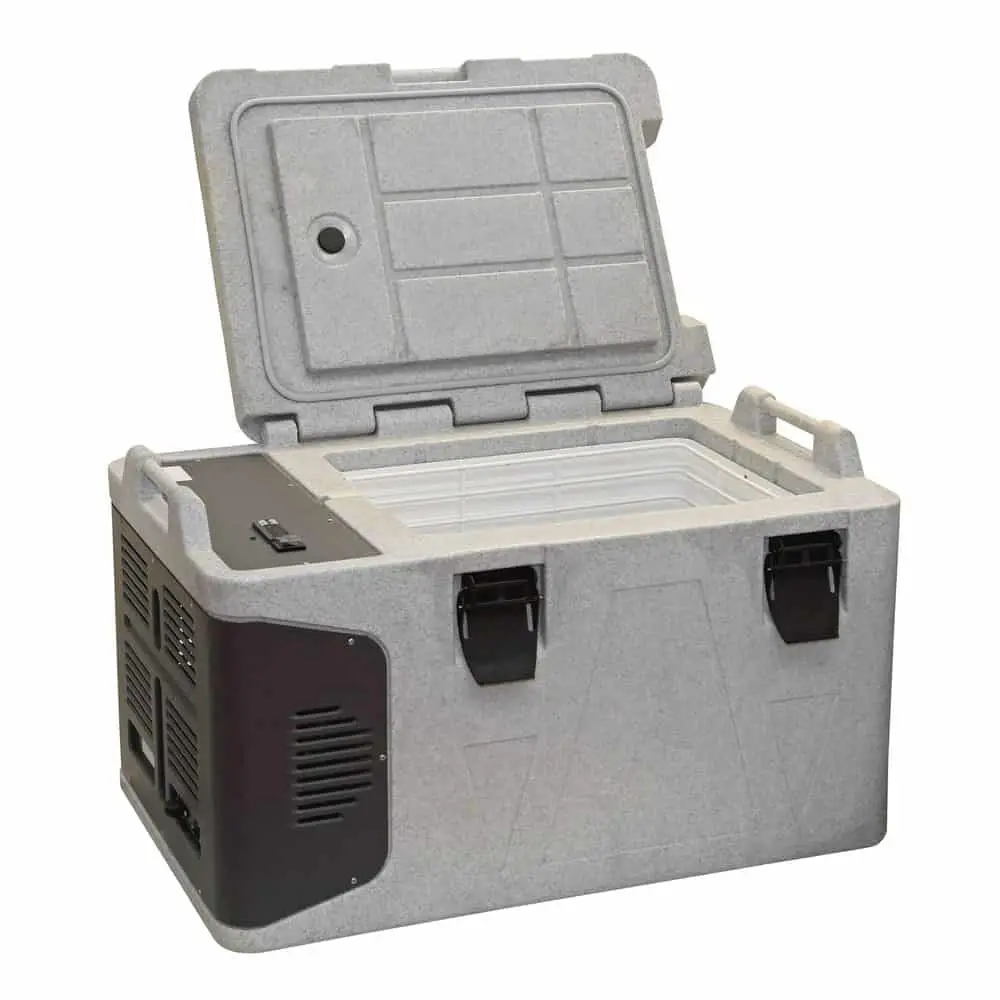As camping enthusiasts, we enjoy getting creative with our cooking techniques when we’re roughing it in the great outdoors.
However, there’s one aspect of this that’s easy to overlook: How to keep cold ingredients at the proper temperature until it’s time to cook. Below, find our picks for the best 12-volt portable refrigerators for camping.
1. ARB ZERO Portable Fridge Freezer -Best Portable Refrigerator Overall
2. Alpicool C20 Portable Refrigerator -Best For Budget Shoppers
3. ICECO VL45 Portable Refrigerator -Best Runner Up
4. Costway Car Refrigerator -Best Middle Of The Road Option
5. BODEGA 12 Volt Car Refrigerator And Portable Freezer –Best Low Profile Option
Best 12-Volt Portable Refrigerators For RV’s And Campers: Product Review Guide
1. ARB ZERO Portable Fridge Freezer -Best Portable Refrigerator Overall
The ARB 10802692 model earns the designation of “Best 12 Volt Refrigerator” for many reasons. If you’re looking for a portable freezer and fridge combination that’s capable of running on very little power, we would recommend giving this one a try.
This ingenious unit includes an internal freezer compartment that comes with an optional divider, meaning you can remove it if you don’t need separate compartments. The removable wire basket is ideal for holding taller bottles.
The outer casing is made of durable steel, and the recessed carry handles, reversible quick-release lid, and low power draw interior LED light offer added convenience. There’s even a USB port for charging phones and tablets, as well as a dual DC power inlet.
| Size | Cooling System | Temperature Range |
| 69L | Compressor | -7—50+ degrees Fahrenheit |
2. Alpicool C20 Portable Refrigerator –Best For Budget Shoppers
Casual campers are sure to appreciate the Alpicool C20 Portable Refrigerator, especially if they’re on a budget. While this 20-liter unit is considerably smaller than most of the other units listed here, it has plenty to recommend it.
The construction is both durable and lightweight, with an interior that can hold up to 25 12-ounce cans. Because it’s capable of reaching temps as low as -4 degrees Fahrenheit, it can easily double as a freezer. The compressor is compatible with solar-based power systems, so you can easily take it along on off-grid RV expeditions. A reliable and efficient battery protection system is also included.
| Size | Cooling System | Temperature Range |
| 20L | Compressor | -4—68+ degrees Fahrenheit |
3. ICECO VL45 Portable Refrigerator—Best Runner Up
The ICECO VL45 Portable Refrigerator has a cooling range from 0 to 50 degrees Fahrenheit. Whether you need to preserve leftover meat products or keep beverages cold, this nifty machine should have you covered.
The unit is equipped with a DC cord and AC cable. The 12 volt DC and 110-240V AC output port is designed to run safely and efficiently with regards to the environment. Our main complaint is that it runs on the loud side, but depending on the size of your RV, this might not bother you as much.
The company offers a five-year warranty on the compressor, along with a one-year warranty on the other parts. Customer service is generally helpful, but it might take a few tries if the issue you’re dealing with requires a great deal of special attention.
| Size | Cooling System | Temperature Range |
| 45L | Compressor | 0—50+ degrees Fahrenheit |
4. Costway Car Refrigerator
The Costway Car Refrigerator is a good middle-of-the-road option. Like the Dometic offering, it features a digital readout display and is capable of maintaining cool temperatures even in hot weather. However, the price tag is much lower, making this a more feasible alternative for budget-conscious shoppers.
The Costway has a 52-liter capacity, putting it on the larger end of the spectrum. If this will be your primary refrigeration source, the extra space is sure to come in handy. It’s also shockproof, so you won’t have to worry about the contents suffering damage when you travel over rough terrain.
With this fridge, you have the option of choosing between an energy-saving (ECO) or rapid cooling (MAX) mode. The digital readout makes it easy to adjust the temperature. Aside from the Dometic CFX model, this is likely the most user-friendly fridge on our list.
| Size | Cooling System | Temperature Range |
| 52L | Compressor | -4—50+ degrees Fahrenheit |
5. BODEGA 12 Volt Car Refrigerator And Portable Freezer -Best Low Profile Option
If you’re looking for a 12 volt refrigerator that can fit easily into a corner of your small camper, the BODEGA might be just the model for you. Even if you think you don’t have enough space for a portable refrigerator freezer, this one could change your mind.
With this unit, you have the option of dual zone operation, but you can remove the middle plate if you need all the space to keep drinks cold. Speaking of beverages, it has a 40-can capacity, making it ideal for tailgating.
If you need to turn the power off at any point during your travels, the BODEGA will keep your food cold during extended off grid trips. We also appreciate the fact that it runs quietly, and the non-slip base ensures that it will remain in place when your vehicle is navigating steep hills.
Although the low price point is attractive, you might wind up with a dead battery after just a few months of use. Full-timers might want to consider investing in a higher-priced 12 volt refrigerator instead.
| Size | Cooling System | Temperature Range |
| 36L | Compressor | -4—68+ degrees Fahrenheit |
How To Choose the Best Camping Fridge
So, you’ve determined that your camping adventures require a portable fridge. How do you go about choosing the best one? Here’s a list of factors to consider as you begin your search.
Budget
As with any major purchase, you should first determine how much you’re willing and able to spend. You’ll have a broad range to choose from in terms of price, but the quality of the units tends to fall along a similar spectrum.
Occasional campers will probably be happy with a lower-priced model. Full-time RVers, on the other hand, would be better off investing in a high-end fridge. In addition to being more reliable, the pricier units also tend to last longer, so you’re likely to get your money’s worth.
Capacity
Next, think about how much space you’ll need. Will this be your only refrigeration source, or are you merely looking to supplement an existing fridge? What foods and beverages will you be trying to keep cool? How often do you plan to shop for supplies? Will you need a freezer compartment, and if so, how large should it be?
While camping fridges come in a variety of sizes, 40L is the most common. To give you some idea of how big that is, a 40L fridge can hold 60 12-ounce cans. With a fridge this size, a family of two or three people could expect to restock every three to four days. If you’re on your own, you could probably stretch its contents over an entire week.
If you think you’ll need more space, look for a fridge with an interior capacity of 50L or more.
Freezer
Are you expecting to pack items that need to be kept frozen? If so, make sure that the fridge has a freezer compartment as well. Many units can be used as either a refrigerator or a freezer, while others feature dual zones for each.
Remember that a freezer needs to run at 0 degrees Fahrenheit or lower if the food is to be stored properly. See our Temperature Range section below for more precise information.
Compressor vs. Thermoelectric Cooling
The majority of portable 12-volt refrigerators will run off a compressor, but some of the more recent models might employ thermoelectric energy instead. There are pros and cons to each of these options. Make sure to choose the system that will work best in your particular circumstances.
A unit that comes with its own compressor will be more powerful than a thermoelectric refrigerator. It will also be more capable of adapting to a higher outside air temperature. As a result, they usually have a greater maximum capacity as well.
Thermoelectric coolers are quieter and offer better energy efficiency, but these units are typically low-capacity. Their heat sensitivity makes them a poor choice in warmer weather. Because they run continuously, they’ll also be a drain on your electrical system, which makes them more expensive to maintain.
A thermoelectric cooler might be a good choice for you if you just want a cold drink or two to take on the road. If you’re bringing a great deal of cold food along, however, we would suggest limiting your search to include only compression-style RV refrigerators.
Absorption Refrigerators
You also have a third option in the form of absorption refrigerators. An absorption refrigerator usually takes its power draw from solar energy, although in some cases, fossil-fueled flames and district heating systems are used to power the cooling process instead.
This system uses evaporative cooling to dissolve one coolant into a second one. After this process takes place, heat is applied to reset the coolants to their former states. This same principle can be used for air conditioning, but in this case, it’s a great way to keep your food items cold while you’re on the road.
These fridge models are a popular choice for RV use because they can be heated by a propane burner, DC power (either from a battery bank or electrical system), or a mains-powered electric heater. Best of all, an absorption refrigerator works without the benefit of any moving parts, unless you count the coolants.
Temperature Range
A refrigerator should run in the range of 34-40 degrees Fahrenheit in order to keep food and beverages cooled to the proper temperature. As such, most compressor-driven portable fridges will offer a range of 0 to 50 degrees, especially if there’s a freezer component.
It should be noted that while 0 degrees is considered the safe temperature for frozen foods, it’s better to keep some items colder still. For example, ice cream can become unpleasantly soft at temperatures higher than -8 degrees Fahrenheit. If you’re planning to pack ice cream sandwiches on your next camping trip, seek out a unit that’s capable of achieving lower temps.
Special Features
Features such as LED lighting, drain plugs, organizing baskets, and dairy compartments are standard. An insulated cover will help keep the temperature inside from being overly affected by the outside temperature, and without a major power draw.
Some units, however, might go the extra mile by offering Wi-Fi capability, a USB port, remote readouts, built in speed control, the ability to adapt to solar power, or other cool extras. There’s no need to drop additional cash if you don’t think you’d take advantage of these benefits, but it’s nice to have the option.
Warranty
The standard warranty on a portable 12-volt fridge runs from 1-3 years, depending on the brand. Sometimes the length of the warranty can vary, depending on the country in which the purchase was made, so be sure to read the fine print.
Also, find out what is and isn’t covered by the guarantee when you look up this information. Normal wear and tear usually doesn’t fall under the umbrella—the company is only responsible for replacing missing or defective parts.
In Conclusion
Is a portable refrigerator a vital component of a successful camping expedition? For most people, no—you might be able to get by with a few well-equipped coolers. If you’re like us, however, you’ll find that proper refrigeration will go a long way toward turning your ordinary cookout staples into memorable meals.
Best of luck, and happy camping!
Check out our article on: 8 Best Coolers For Camping And RVing

